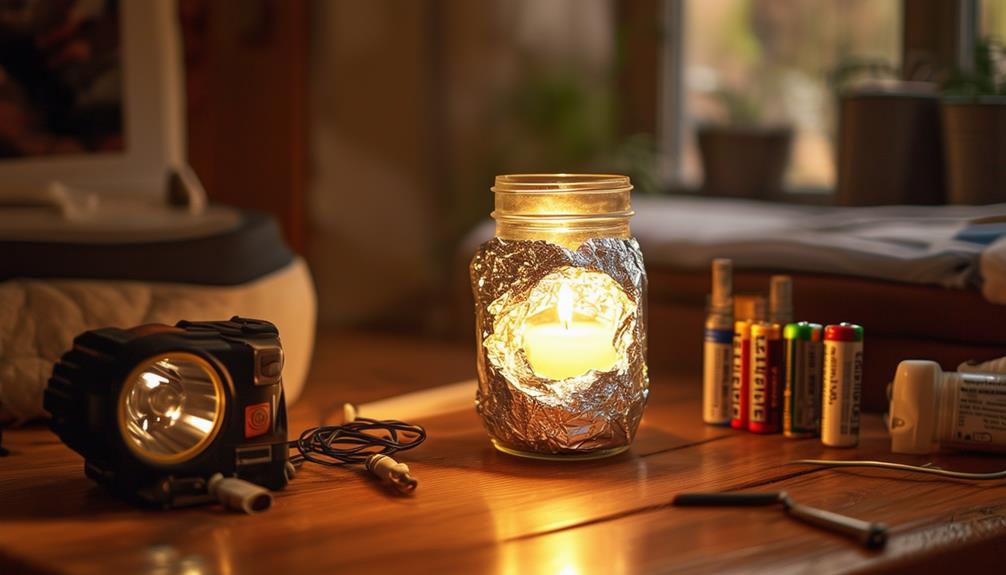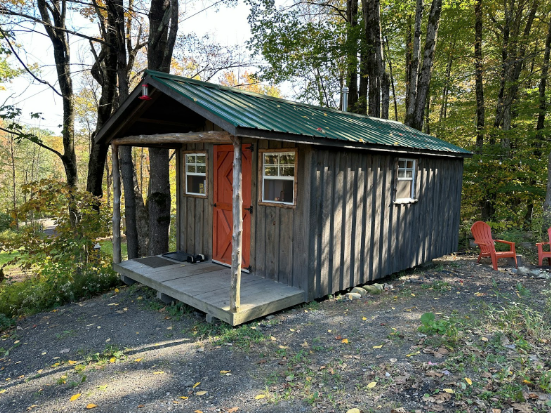Using Technology Wisely Off the Grid: Solar Power, DIY Gadgets, and Offline Tools
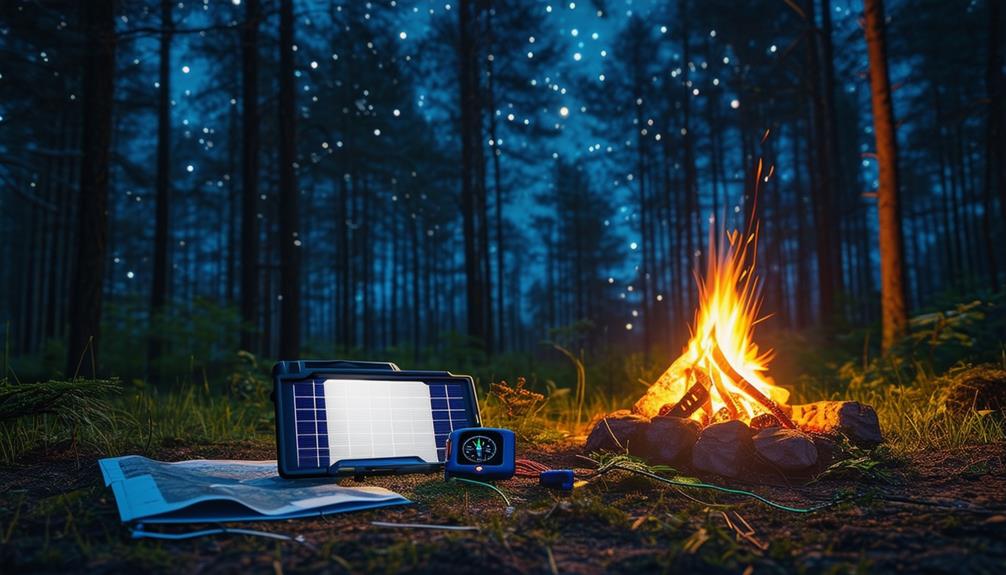
Living off the grid necessitates using technology wisely for sustainability and self-sufficiency. Solar power provides a dependable energy source, while DIY gadgets enhance your ability to communicate, navigate, and construct.
Essential offline tools, such as solar-powered radios and physical resources, ensure you are prepared for any situation. But how do you effectively integrate these elements to create a resilient and functional off-grid lifestyle?
Let's explore the strategies and tools that can help you thrive independently of traditional systems, and identify the key factors that make this lifestyle work seamlessly.
Off-Grid Solar Power
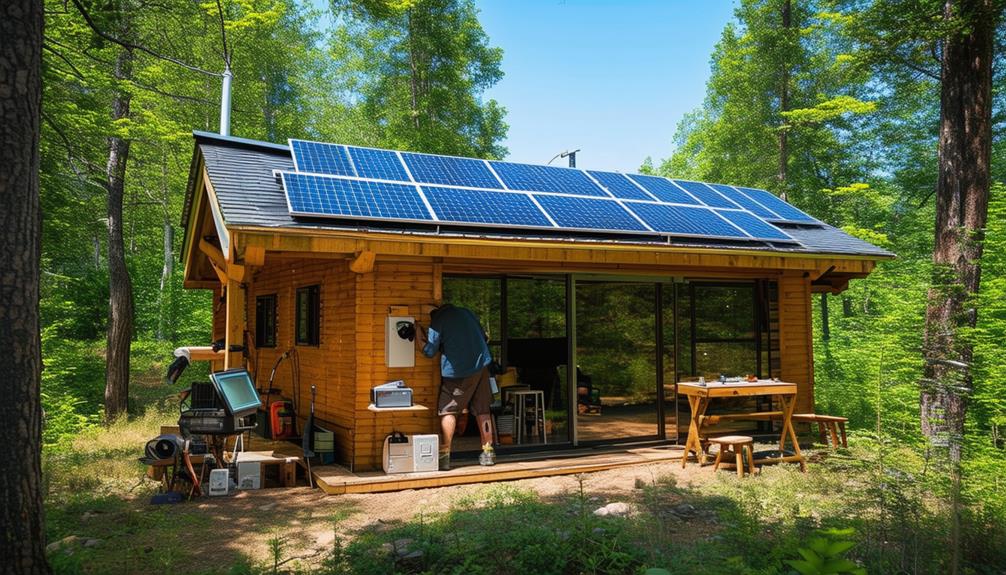
When living away from the conventional power grid, off-grid solar power systems provide a reliable and sustainable energy solution. These systems include essential components such as solar panels, batteries, charge controllers, and inverters. Understanding each component is crucial for planning your DIY off-grid setup.
Solar panels capture sunlight and convert it to electricity, while batteries store this energy for use when the sun isn't shining. Charge controllers regulate the energy flow to prevent battery overcharge, and inverters convert the stored DC power to AC power for household use.
Ground-mounted solar panels are often more cost-effective and easier to maintain compared to roof-mounted options. They offer flexibility in placement, allowing for optimal sun exposure and easier maintenance tasks like cleaning and vegetation trimming.
Maintaining your off-grid solar system ensures its longevity and efficiency. Regularly clean your panels to remove dust and debris, monitor battery health, and check all connections. Scheduled inspections can help identify issues early, preventing costly repairs in the future.
DIY Gadgets and Hacks
Enhance your off-grid experience by creating solar-powered gadgets and offline communication tools. Build your own solar charger or set up an emergency radio.
These DIY projects boost self-sufficiency and make efficient use of available resources.
Solar-Powered Device Hacks
Transform your everyday gadgets into eco-friendly, off-grid solutions with these solar-powered device hacks. Embrace solar power and get creative with DIY projects to make your life more sustainable.
Start with something simple like your traditional flashlight. By adding a small solar panel and rechargeable batteries, you can turn it into a solar-powered flashlight, perfect for emergencies.
Next, consider your basic calculator. Integrate a small solar cell and replace the existing power source to convert it into a solar calculator, ensuring it's always ready without needing batteries.
For those who rely on portable USB chargers, upgrade yours to a solar-powered version by attaching a solar panel and a voltage regulator. This way, you'll have a reliable charging source wherever you go.
Want a solar-powered phone charger? It's easy! Connect a solar panel to a USB charging port, and you can charge your phone off-grid.
Eventually, take your simple radio and attach a solar panel to provide continuous power, making it ideal for remote areas where electricity isn't available.
These solar-powered device hacks not only save energy but also prepare you for off-grid adventures.
Offline Communication Tools
Offline communication tools are essential for maintaining connectivity when traditional networks are down or unavailable. Leveraging solar power and DIY gadgets can help you set up a reliable communication system off the grid. For example, solar-powered radios and walkie-talkies offer continuous communication without depending on electrical grids. Constructing your own Morse code signalers can be both an engaging and practical project, ensuring you have a fail-safe method for sending messages.
Offline messaging apps like Briar and FireChat facilitate text communication without internet access, making them ideal for off-grid situations. Techniques like creating makeshift antennas to enhance signal reception or using reflective surfaces to amplify Wi-Fi signals can also be beneficial.
Here's a table illustrating some effective offline communication tools:
| Tool | Description |
|---|---|
| Solar-Powered Radios | Continuous communication using solar energy |
| Walkie-Talkies | Short-range but reliable voice communication |
| Offline Messaging Apps | Apps like Briar and FireChat for text communication |
Additionally, physical bulletin boards and message drop boxes offer low-tech methods for sharing information within a community. You can also create a network of mesh devices using Raspberry Pi or Arduino, establishing a decentralized communication system. These DIY gadgets and methods ensure you remain connected, even when off the grid.
Offline Tools and Resources
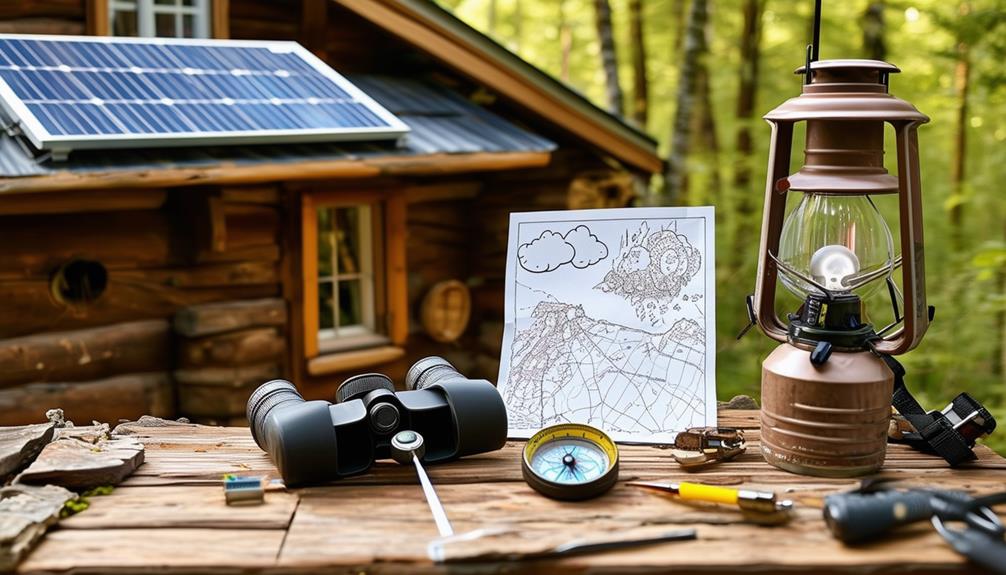
When you're off the grid, having access to offline tools and DIY resource guides can be crucial. Downloading ebooks on topics such as sustainable living, water management, and medical care provides you with essential knowledge.
These resources enable you to build and maintain a self-sufficient lifestyle.
Essential Offline Tools
Equipping yourself with essential offline tools is crucial for thriving off the grid. While renewable energy sources like solar power and DIY gadgets can greatly enhance your off-grid experience, vital offline tools are necessary for everyday tasks and emergency situations. Essential tools include hand tools, compasses, whistles, and fire starters, which ensure your safety and preparedness.
Physical tools such as axes, saws, shovels, and knives are indispensable for construction, maintenance, and survival tasks. These tools enable you to handle a wide range of projects, from chopping wood to building shelters. Additionally, survival guides, printed books, and physical maps are invaluable resources that provide crucial information without the need for internet access.
First aid kits are another must-have, as they ensure you can manage medical emergencies when far from professional help. With these offline tools, you can effectively meet your daily needs and be prepared for any challenges that arise.
DIY Resource Guides
Exploring the world of off-grid living becomes much easier with DIY resource guides that provide step-by-step instructions and practical tips. These guides are invaluable for constructing solar power systems, crafting DIY gadgets, and mastering offline tools. Whether you're aiming for self-sufficiency or sustainability, these resources cover everything from energy conservation to alternative energy sources.
Offline DIY resource guides offer a wealth of information without relying on internet connectivity, making them perfect for off-grid scenarios. You'll find printed manuals, guides, and physical tools necessary for your projects. These resources cover vital topics, ensuring you have the knowledge to build and maintain systems even in remote locations.
Here's a quick overview of what you might find in these guides:
| Topic | Description |
|---|---|
| Solar Power Systems | How to design and install solar panels |
| DIY Gadgets | Building custom devices for daily use |
| Offline Tools | Using manual tools effectively |
| Energy Conservation | Tips for reducing energy consumption |
Building a Local Network
To build a reliable off-grid local network, start by setting up a mesh LAN with routers and open-source software. Integrate solar power to ensure the network operates on renewable energy. Use affordable travel routers that can be powered by solar panels, as they're cost-effective and easy to deploy, expanding your network's reach.
Utilize RF technology to connect networks over longer distances, ensuring strong connectivity even in remote areas. Involving your neighbors is key to success; encourage them to power their own routers, enhancing the network's scalability and reliability. This cooperative approach not only bolsters the network but also fosters a community centered around self-sufficiency and renewable energy.
Ensure your network is platform-agnostic and features a modular design, allowing for easy expansion and maintenance. This makes it simple to incorporate new technologies or additional nodes as needed. By adhering to these principles, you can create a resilient and sustainable local network that thrives off the grid.
Energy Storage Solutions
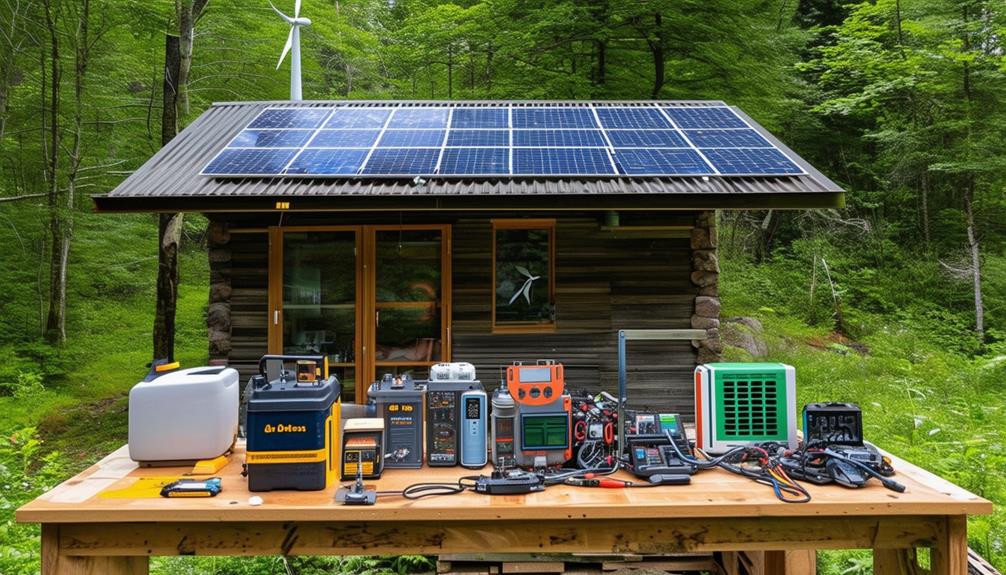
Efficient energy storage is crucial for maintaining a reliable off-grid power system. For your setup, you'll need a robust battery bank to store the energy generated by your solar panels and other power sources.
In this DIY solar project, using two Exide Orbital gel-cell deep-cycle batteries is an excellent choice due to their durability and efficiency, which are vital for long-term energy storage.
Your 60-watt solar array will harness solar energy, feeding it directly into the battery bank. This setup ensures a steady reserve of power for use during cloudy days or at night. An inverter is required to convert the stored energy into a usable form, allowing you to run electronic devices smoothly.
To enhance energy generation, consider adding a small wind turbine. This component can provide supplemental power on windy days when solar panels may be less effective.
Additionally, having a portable gasoline generator as a backup ensures you're never left without power, even during extended periods of low sunlight or wind.
Community Collaboration
Collaborating with your neighbors can significantly enhance the resilience and efficiency of your off-grid system. By fostering community collaboration, you'll not only improve connectivity but also establish a robust support network to tackle challenges more effectively.
Here's how community collaboration can transform your off-grid experience:
- Resource Sharing: Pooling resources for solar power installations and maintenance makes the system more sustainable and cost-effective.
- Skill Exchange: Sharing skills and knowledge within the community empowers everyone to contribute and become more self-sufficient.
- Joint Projects: Engaging in workshops or work parties accelerates progress on projects and strengthens community bonds.
- Collective Problem-Solving: Building a network of like-minded individuals provides support and knowledge exchange, preparing you for any off-grid challenges.
Pooling resources for maintenance and upgrades enhances system reliability, while joint projects uplift morale and foster unity. These activities not only speed up progress but also ensure everyone feels invested in collective success.
Conclusion
By adopting off-grid solar power, DIY gadgets, and offline tools, you can achieve independence and sustainability. You have learned to harness solar energy, create practical DIY solutions, and utilize essential offline resources.
Building a local network and collaborating with your community further enhances resilience. With these strategies and tools, you're prepared to face any challenge and enjoy a self-sufficient lifestyle, free from traditional grid dependencies.
Stay resourceful and continue innovating!



